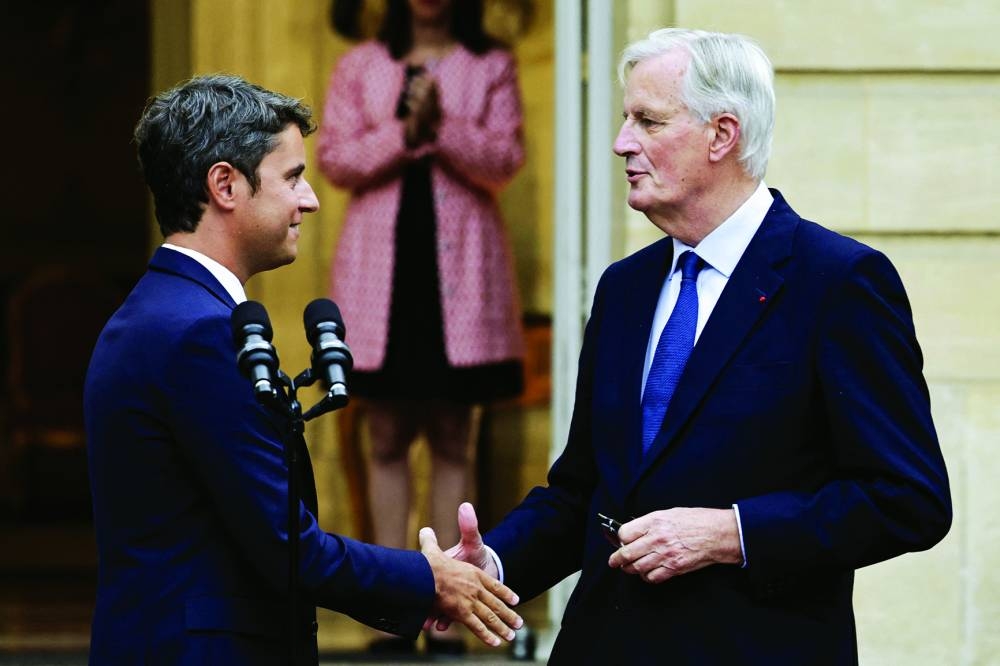French President Emmanuel Macron has named the European Union’s former Brexit negotiator Michel Barnier as new prime minister, counting on the veteran politician to end two months of political deadlock after snap elections.
Barnier, 73, the oldest premier in the history of modern France, has been tasked with forming “a unifying government in the service of the country”, the presidency said.
In a striking contrast, the former foreign minister succeeds Gabriel Attal, 35, a man less than half his age and who served only eight months in office during a period of political turbulence unprecedented in recent times in France.
Macron’s move towards “cohabitation” with Barnier, a member of the right-wing Republicans (LR) party and not affiliated to the president’s centrist faction, was greeted with dismay by the left which will now seek to topple him with a no-confidence motion.
Controversially, the president appears to be counting on the far-right National Rally (RN) of Marine Le Pen to keep Barnier in power by voting against such a motion.
A left-wing coalition emerged as France’s biggest political force after the elections earlier this summer, but with not enough seats for an overall majority in an imbroglio that has taken weeks to unravel.
Macron’s centrist faction and the far-right make up the two other major groups in the National Assembly, with the RN as the single largest party.
The president had considered a string of potential prime ministers in recent weeks, none of whom mustered enough support to guarantee a stable government.
Macron believes Barnier can find a majority in the fractured National Assembly, according to the presidency.
“The president believes the prime minister and the future government can meet the conditions to be as stable as possible,” it said.
Barnier has been all but invisible in French political life since failing to win his party’s nomination to challenge Macron for the presidency in 2022 during a campaign where he tacked further right and suggested a moratorium on immigration.
The former foreign minister and EU commissioner is “Macron-compatible” and would not be immediately voted out by parliament, an advisor to the president told AFP, asking not to be named.
A minister in the outgoing government, who also asked not to be named, said that Barnier is “very popular with right-wing members of parliament without being an irritant on the left”.
The RN of Le Pen indicated that it would not automatically vote down Barnier and would wait and see what programme he lays out in his first address to parliament.
“We will wait to see Mr Barnier’s policy speech,” said Le Pen.
Macron’s predecessor Francois Hollande said he believed the RN had “given a kind of endorsement” to Barnier’s appointment.
As well as two stints as an EU commissioner and handling the thorny negotiations on Britain’s exit from the bloc, Barnier served as a minister under the right-wing administrations of presidents Jacques Chirac and Nicolas Sarkozy.
EU Commission President Ursula von der Leyen welcomed his nomination, saying that she knew Barnier had “the interests of Europe and France at heart”.
With a half century career behind him, Barnier who proudly extols his origins in the French Alps rather than Paris, first become a member of parliament aged just 27.
The composition of the new cabinet – set to be announced in the coming days – will be closely watched for signs of concessions to Macron’s political foes.
Hard-left leader Jean-Luc Melenchon, whose Unbowed party (LFI) and allies belong to a left-wing bloc, said Macron naming Barnier meant the election had been “stolen from the French”.
He called for street protests tomorrow.
Another hard-left lawmaker, Mathilde Panot, called it an “unacceptable democratic coup”.
Macron’s decision comes under the gun of a deadline to submit a draft 2025 budget for France’s strained government finances before October 1.
It also marks his attempt to acknowledge rejection of his seven-year rule without giving up on hard-fought reforms, chief among them last year’s widely resented increase to the official retirement age to 64 from 62.
Barnier’s “task looks tough, but difficulty has never scared him”, said former prime minister Edouard Philippe who earlier this week announced that he would seek to succeed Macron in 2027 presidential elections.
After the July election deprived Macron of his relative majority in parliament, the centrist president drew out the appointment of a new prime minister for a period unprecedented since World War II, through the July-August Olympic Games and beyond.
Attal, who commentators believe harbours further political ambitions, bowed out by releasing a slick video of his time in office on his social media channels.
“The bond we have is the most precious thing I have. Count on me to keep on threading it,” he said.

Newly appointed Prime Minister Michel Barnier (right) shakes hands with outgoing Prime Minister Gabriel Attal during the handover ceremony at the Hotel Matignon in Paris. – AFP
